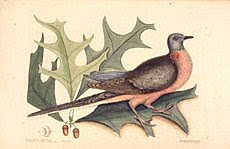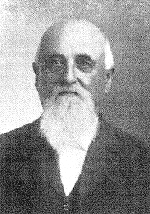Extinct birds credited with creating a farm's rich soil
 Passenger Pigeon
Passenger PigeonIn Judge W. T. Fowler's little book, Christian County, Kentucky, written in 1915, he makes some interesting comments about Mr. R. F. Rives and his farm:
Mr. R. F. Rives is one of the largest wheat growers and tobacco growers in Kentucky. He has in ten years produced 250,000 bushels of wheat on his farm. He is Christian county's largest farmer taxpayer, and is second largest in the county, Forbes Mfg. Co. being the first.
His farm is in the heart of what is known as the "Pigeon Rooset [sic]" section. The wild pigeons in Audubon's day had for their roosting place a forest in Christian county which covered thousands of acres. This is the most productive land in the county. Its yields of wheat, corn, tobacco, clover and alfalfa are marvelous...
[This splendid farm] is a model for stately buildings and neat arrangement. Its master is one of Christian county's sages in agriculture and a man who has mastered the problems of system and management as few have.
The R. F. Rives farm was surely located somewhere in the fine farmlands of southern Christian County. Perhaps it was in the vicinity of today's John Rives Road, a few miles southeast of Hopkinsville, where the Rock Bridge Branch meanders through the fields.
At any rate, it's interesting that the soil had been enriched by passenger pigeon droppings.
 Mr. R. F. Rives
Mr. R. F. RivesNowadays, we'd be worried about histoplasmosis in a place with concentrated bird droppings. Health officials would test for the fungus, and if present, they would place the area under quarantine.
In fact, Hopkinsville spent several hundred thousand dollars just a couple of years ago to replace soil contaminated heavily by bird droppings in a park where big flocks of birds roosted.
A century ago, R. F. Rives just plowed the bird manure into the soil and made the most of his good luck. Ignorance was bliss -- and a whole lot simpler and cheaper.
No comments:
Post a Comment